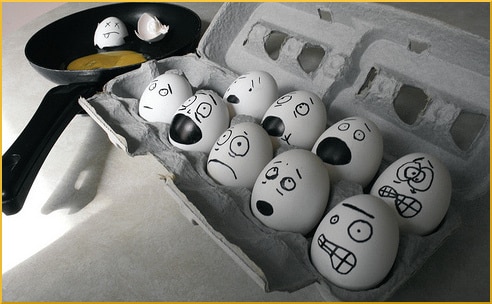
The very fact that Childhood Obesity News has found so much to say about stress eating is a gigantic red flag. People, especially Americans, are not handling their emotions in constructive ways. We experience bad feelings, we want comfort, and instead of going out for an uphill run wearing a 20-pound backpack, we sit down and consume 2,000 empty calories. Is that insane, or what?
In “Comfort Eating and Regular People,” we quoted Dr. Pretlow’s words from Overweight: What Kids Say:
Many overweight and obese kids have never learned to cope with life’s pains, without seeking comfort and stress relief from food, or they have long ago lost those coping skills.
But they should not feel alone, as shown by the extensive number of messages they leave at Weigh2Rock.com. We quoted a 12-year-old who recommends (we hope facetiously) wrestling with younger siblings as an excellent way to burn calories. We quoted a desperate 13-year-old whose cry for help was, “I DON’T KNOW HOW TO STOP. IT’S KILLING ME.” Eating to alleviate stress and attain comfort is based on the erroneous concept that emotions can be drowned or smothered by piling a sufficient quantity of food on top of them.
In “Stress, Boredom, Activity, and Childhood Obesity,” we noticed the paradox of how the causes and the results of stress create their own vicious circle. A teen with depression, poor grades, a drinking problem, a lack of social skills might respond by stress eating, and pile on the pounds. A teen unhappy about being overweight might become depressed, quit caring about grades, get into alcohol or other substances, and become even more alienated from her or his peers. It is a big and complicated problem.
Just recently, we looked at other vicious cycles associated with stress eating. Their existence gives experts reason to insist that simply treating the obesity will probably have an unsatisfactory result, unless the underlying and coexisting problems are resolutely addressed.
In “Ghrelin, Comfort Eating, and Obesity (Part 2),” we looked at the ideas of Dr. Jeffrey Zigman, who studies the relationship between extrinsic stress and the autogenous chemical ghrelin, which regulates the sensations of hunger and satiety. In another recent post, we considered cortisol, nicknamed the “stress hormone.”
A study that was conducted a few years back suggested that when a stressful event is followed up by consuming high-calorie food, the internal effects of stress can actually retard the metabolic processes, to the point where stress eating could be responsible for the addition of many pounds per year. It was a small study, originally intended for another purpose, but it was enough to command the attention of some researchers. The one thing that this and much other research has shown for sure is that “There’s more to obesity than a lack of willpower, it’s a complex biological problem.”
Your responses and feedback are welcome!
Photo credit: Bernard Goldbach (topgold) via Visualhunt/CC BY

 FAQs and Media Requests:
FAQs and Media Requests: 











